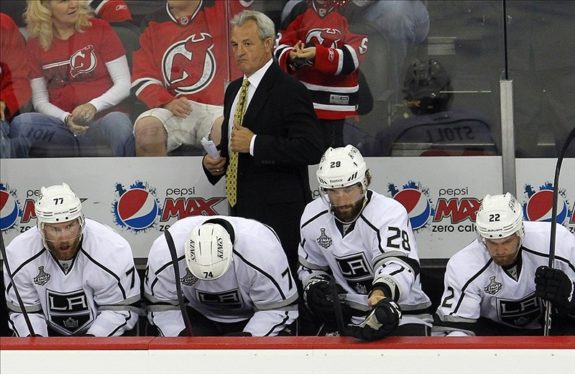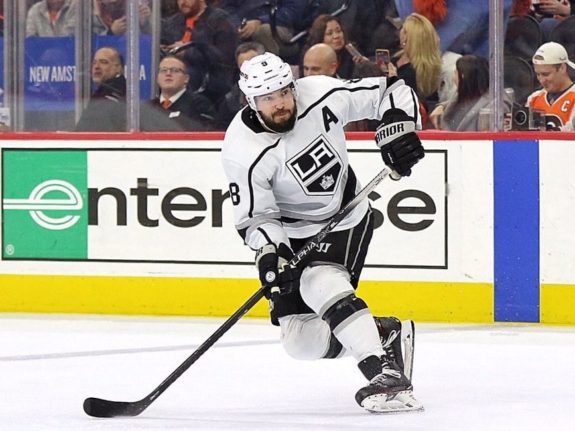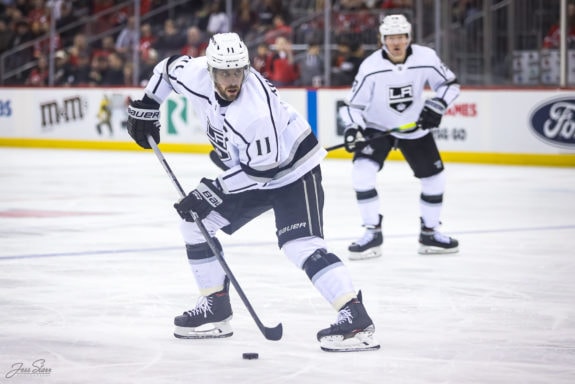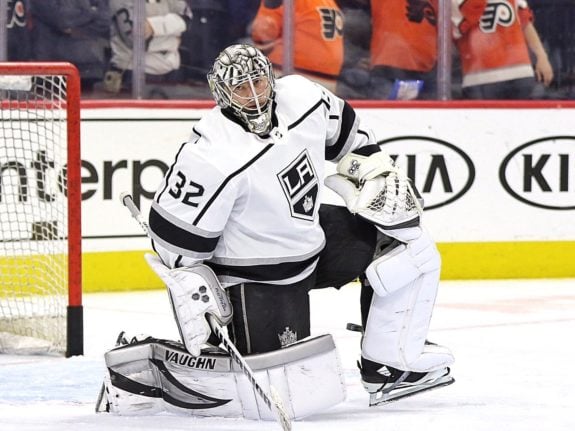The Los Angeles Kings won the Stanley Cup twice in three seasons, hoisting the Cup in 2012 and 2014, respectively. They were one of the more successful teams in the NHL and arguably a modern dynasty in the previous decade, with only the Chicago Blackhawks winning the Cup more times with three championships. Looking back, however, it’s hard not to think of those Kings teams as some of the outliers in NHL history and when thinking of other champions. They were a team that stood out in comparison to the Stanley Cup winners of the 2010s and even the past 20 seasons.
The Kings Record & Regular Season
Both Stanley Cup seasons for the Kings featured teams with poor regular-season records as they were often the final team in the Western Conference to reach the playoffs. The 2012 champions, in particular, were a mediocre regular season team as they failed to win 50% or more of their regular-season games, winning only 40 of their 82 games, yet they went on to win the Cup.
The 2011-12 Kings were the first team to win the Stanley Cup without winning the majority of their regular-season games since the Detroit Red Wings only won 36 games in the 1996-97 NHL season. Interestingly, the Montreal Canadiens in the 2020-21 NHL season would have been the first team since to win the Cup while losing the majority of their games as the Canadiens only won 24 of their 56 regular-season games, yet they lost to the Tampa Bay Lightning in five games in the Stanley Cup Final.
The Kings 2011-12 regular season was bad enough that the front office fired their head coach, Terry Murray, and replaced him a few games later with Darryl Sutter, who led the team to the Stanley Cup and coached the team to their second championship in 2014. Interim coaches leading their teams to the Stanley Cup are rare but not uncommon, Mike Sullivan led the Pittsburgh Penguins to the Cup in the 2015-16 season, and Craig Berube led the St. Louis Blues in the 2018-19 season. The Kings’ interim situation is unique because Sutter was the third head coach for the team in the 2011-12 season, with John Stevens filling in as an interim for four games after Murray was fired.

The playoffs are known for upsets and inferior teams advancing but rarely will a team with such a poor regular season sustain success to advance in four consecutive rounds. In addition to the 2011-12 Kings being an outlier from a record standpoint, the 2014 Cup champions were outliers as a team with low seed that sustained playoff success. The divisions re-aligned starting in the 2012-13 season, with two divisions in each conference, and as a result, seeding would be one through four. The 2014 champions were the first three-seed in a conference to win the Stanley Cup until the Blues won the Cup in 2019. The NHL is known for underdogs winning, but ultimately the top teams are the ones that win the Cup, making the Kings one of the few outliers.
The Age of the 2012 Champs
There is a “sweet spot” for the age of a Stanley Cup contending roster with many veterans to help lead the team but not an aging roster that struggles to keep up with their opponents. In the past 20 years, the Red Wings were the only team with an average age of their roster above the age of 30 in both 2001-02 and 2007-08 respectively, led by Hall of Fame veterans like Nicklas Lidstrom, Steve Yzerman, and Sergei Fedorov. The 2012 Kings, in particular, were an unusually young roster with an average age of 26.7 of their players with some of their younger skaters like 26-year-old Jonathan Quick, 22-year-old Drew Doughty, 24-year-old Alec Martinez, and 24-year-old Anze Kopitar leading the way.

The 2011-12 Kings were the youngest roster of the previous decade to win the Stanley Cup, and the roster broke the common perception that a championship roster needs a veteran presence or playoff experience. While the 2008-09 Penguins and the 2009-10 Blackhawks also won the Stanley Cup with young rosters as both teams average age of their players was 26.6, the Kings won with essentially no veteran presence on the roster aside from forward Justin Williams, who won the Conn Smythe Trophy in the 2014 Stanley Cup Playoffs, and Willie Mitchell on the defensive unit.
The 2014 champions were an older and more experienced group with many of the key contributors from the 2012 roster returning and leading the way, but the first time they won the Cup, they were a young and untested group yet were unfazed by the opponents and the playoff atmosphere.
The Kings Lacked a Goal Scoring Presence
What makes both Kings’ rosters truly unique and an outlier from the other champions was their lack of a scoring presence or offense in general. The team scored 2.29 goals per game in the 2011-12 regular season and 2.41 goals per game in the 2013-14 regular season, both of which were the lowest totals for any Cup champion of the past 20 seasons, but even the low points per game totals don’t tell the full story for how the team failed to generate a viable offense in those seasons.
For starters, the team didn’t possess a top-line scoring presence, especially in the 2013-14 regular season when the top line consisted of Kopitar, Williams, and Dustin Brown, a trio that combined for 63 goals that season, 29 of which were from Kopitar individually as he emerged as one of the league’s top players. However, the lack of scoring depth stands out historically as both Kings’ rosters didn’t have 10 skaters with 10 goals or more in the regular season, a quality that has proven to be a necessity of Cup-contending teams. The Kings were the first team to win the Stanley Cup without the scoring presence on the backend since the Anaheim Ducks, who won the Cup in 2006-07 and the only other champion in a full 82-game regular season to not have 10 skaters score 10 or more regular-season goals were the Penguins in 2015-16.

Additionally, the Kings didn’t have a top 10 power-play unit both seasons. While many of the recent teams failed to finish top 10 in the power play in the past decade and then proceeded to win the Stanley Cup, including the Blackhawks in all three of their championship seasons, the Kings were below league average power-play unit in both Cup seasons. In the 2011-12 regular season, the team scored only on 16.96% of power plays in comparison to the league average of 17.31%, and in 2013-14, the team scored only 15.14% of power plays compared to the 17.89% league average.
To top off their struggling offense, the team failed to possess one of the key attributes that oftentimes help bail out a struggling forward unit in the Stanley Cup Playoffs in scoring defensemen. Many teams that win the Stanley Cup have at least one defenseman that could provide that extra scoring presence from the point. The Kings, however, didn’t have a defenseman with 40 points or more in the regular season yet won the Cup both times. The Kings were the first team since the 2008-09 Penguins that didn’t have a 40-point defenseman in the regular season to win the Cup and the only team since in a full 82-game NHL season, only adding to the oddity of their Stanley Cup success.
What the Kings Had in Common with Other Cup Teams?
For all the outliers the Kings possessed on the offensive end of the ice, they possessed one of the best goaltenders in the game in the prime of his career in Quick.
Quick had two great seasons in the years the Kings won the Cup, with a .929 save percentage and 1.95 goals-against average on 1,863 shots in the 2011-12 season, making him a Vezina Trophy finalist, and a .915 save percentage and 2.07 goals-against average on 1183 shots in the 2013-14 season. More importantly, like many great goaltenders on Stanley Cup teams, the Kings goaltender stepped up in the playoffs and helped carry the team to the Stanley Cup Final.

Helping out Quick, the Kings always provided two strong defensive pairings. Historically, teams that win the Cup will have at least one great defensive pairing that can carry the unit and the team, especially in the playoffs. The Kings had Mitchell and Slava Voynov as one defensive pairing while Doughty paired with Robert Scuderi in the 2011-12 season and then paired with Jake Muzzin in the 2013-14 season. The team was led by their defense but considering how the roster was built and the regular season struggles overall, they broke the trends for traditional Stanley Cup teams and how a championship team looks in the NHL.